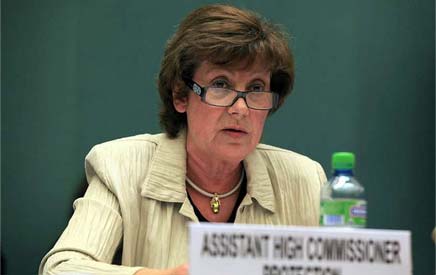|
UNHCR Assistant High Commissioner for Protection says the main reason why most countries of the world do not accept the Mujahedin-e Khalq members is that they perceive these people as having a (negative) impact on their national security. |
 During a meeting with Iraqi deputy foreign minister in UNHCR’s headquarters in Geneva, Ms. Erika Feller said that the UNHCR will put all great amounts of effort at convincing countries to resettle Mujahedin-e Khalq in their countries, Habilian Foundation website reported on Sunday.
During a meeting with Iraqi deputy foreign minister in UNHCR’s headquarters in Geneva, Ms. Erika Feller said that the UNHCR will put all great amounts of effort at convincing countries to resettle Mujahedin-e Khalq in their countries, Habilian Foundation website reported on Sunday.
She referred to the UNHCR’s efforts to register and interview MKO members, adding that so far some countries have expressed readiness to accept a number of them.
Feller went on to say that another meeting will be held next month on this issue.
Iraq's deputy foreign minister, for his part, reiterated his country’s call for the expulsion of terrorist Mujahedin-e Khalq Organization (MKO, a.k.a. MEK and PMOI) from Iraq.
Labid Majid Abbawi pointed to the Iraqi government’s decision to close down Camp Ashraf, underlining that the terrorist group’s presence in Iraq is “against (Iraqi) Constitution and a threat to Iraq’s security.”
“No country has been adhered to the obligations in the agreement signed in December 2011,” said Abbwi, causing the MEK members at Ashraf to refuse to leave the Camp.
Abbawi called on UNHCR to apply more pressure to the countries that pledged cooperation in this issue.
